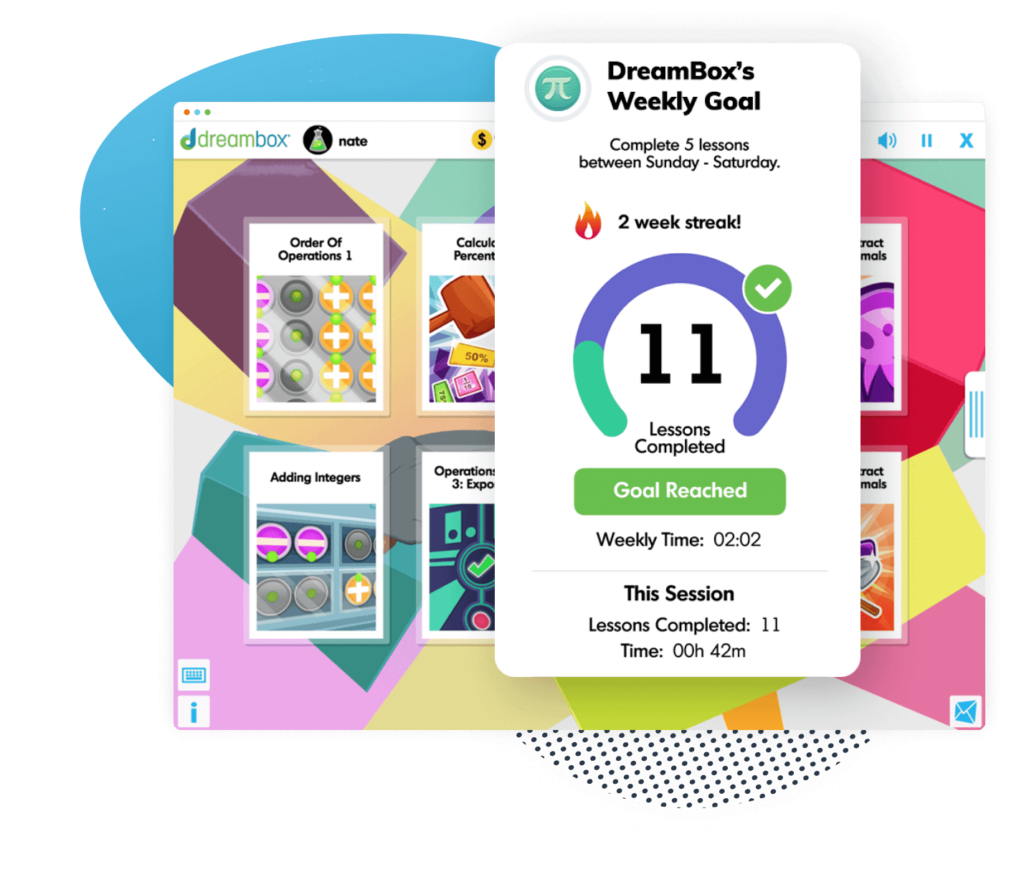Why Is Math Hard?
Math can be tough for some students. For many, learning how to approach math problems differently can be the key to solving mathematics stress.

Author
Jill Padfield
Published:
Oct 2024
Key takeaways
- There isn’t a singular reason math is hard for some people – Determining the cause often requires trial and error—but it’s worth it in the long run. After the reason for the difficulties is found, parents and teachers can work with learners to address any needs.
- Math anxiety is real, and it can affect your student – This form of nervousness can undermine even the smartest students without intervention. Building confidence around math skills and in the context of your child’s understanding of self-value and self-perception is key.
- Troubles with mathematical concepts can start in any grade – And that’s okay! Parents can stay connected with teachers to ensure that they are available to help enrich their child’s learning journey.
Math can be a source of learning difficulty for many. It may seem that no matter how much practice a student does, they can still feel overwhelmed by word problems, formulas, and equations.
It’s not easy to admit. However, it can be encouraging for your student to know that this stuff can get better with lots of practice and support from parents and teachers.
Oh, and we want to debunk the “some people just don’t get math” comment that swirls around. Everyone can be a “math person.” Some people might just need to learn in different ways—or they may need a little extra help on their journey.
Read on to learn more about how parents and teachers can help students identify the reasons they might be having difficulties in math, as well as new strategies that can help them to hone math skills to use in their everyday lives.
8 reasons why students struggle with math
There are plenty of reasons why students might struggle with math concepts. They could be dealing with a self-fulfilling prophecy problem, they could have a learning disability, or they may just find math to have difficult concepts.
No matter what reason is at the core of your child’s math issues, it can be possible to overcome. Understanding the root cause of the difficulties is an important step in determining how you can best help them master the most challenging concepts in math—whatever those may be for your student.
Here are a few reasons your child may be experiencing math problems:
1. Concentration and attention difficulties
These things can affect even the best and brightest in math class—and can become evident in elementary school, middle school, or high school. While some may not experience this to the degree that they would with a learning disability, the attention span difficulties and inability to concentrate can lead to a compromised learning experience.
The best step to take if you suspect that these concerns are affecting your child is to seek a formal diagnosis from their practitioner. They can help you to identify your child’s risk profile, evaluate your child for a learning disability that can display these symptoms, and provide targeted suggestions to improve your child’s symptoms.
Table of contents
Get help with math with DreamBox!
Turn math into playtime with DreamBox Math
DREAMBOX MATH
Get started for FREE today!

2. A lack of understanding
Math often features difficult problems presented in different ways. A lack of understanding in the core concepts of math can lead to problems later on—possibly affecting your child’s confidence.
Outside pressure to appear like they understand complex concepts can be a root cause of this issue. You may consider tutoring or extra support if you believe this to be the cause of your child’s math difficulties.
3. Specific learning difficulties or disabilities
Formal learning disabilities or difficulties can be to blame for those experiencing challenges in math. Intellectual disabilities often require support from a child’s medical team, teachers, and parents to overcome—so communication is key to preserving your child’s learning experience.
If you believe this is the cause of your child’s math concerns, it’s helpful to ask for your practitioner’s support in approaching the teacher or institution. They can work with you and your child’s teacher in creating a plan that suits your child’s unique needs.
4. Lack of patience
Does your child tend to speed through daily life? If so, they may simply be going too “fast” to try to get the correct answer, skipping crucial steps along the way. To combat this possible cause, it can be helpful to encourage your child to take all the time they need to solve the problem. You might also try to see if there’s anything in the child’s environment that might make them feel as if they are being rushed. Perhaps they are over-committed, or they may be overwhelmed with their other workload(s).
Problem-solving and critical thinking are the most effective when your student isn’t rushed.
5. Lack of interest or “natural talent”
Many might feel (or fear) that they are not true “math people.” However, recent research suggests that there might be no such thing. Hard work, consistent study, and encouragement can be more important to math skill formation than any inherent “talent” for math.
Encouraging students using new methods of learning can be helpful if you think that they are experiencing a lack of interest toward math.
6. Missing basic concepts
Some students may feel as if they are “shaky” on foundational math concepts. However, some may feel that they have entirely missed them! This can happen for a number of reasons—such as the COVID pandemic or experiencing a stressful event or time period that could have been a distraction from their learning experience.
Tutoring and calling this risk to the teacher’s attention can help students get the support they need to regain confidence and thrive.
7. Different thinking methods
Some people see things differently. What method of resolution may work for some in certain math problems may not work for others. Understanding this and presenting students with alternative methods of problem-solving can support students who may be dealing with this difficulty.
8. Math anxiety
Fear around math, failure, or “looking dumb” in front of peers can cause students to avoid math entirely. Encouragement from parents and teachers is key to help students to resist the urge to “avoid” the topic, along with showing them that it’s okay to give it your best shot (even if you mess up!).

The math program that drives results
Get started today!
DreamBox adapts to your child’s level and learning needs, ensuring they are appropriately challenged and get confidence-building wins.
8 solutions to make a better math student
Looking for extra ways you can help your learner? We’ve got you covered. Here’s what our experts recommend:
1. Discuss math difficulties with your child’s teacher
Your teacher is a major resource you can turn to when it comes to your child’s unique learning journey. Bringing up any fears or concerns early on can make a world of difference in your child’s experience—connecting them with support they need both in and out of the classroom.
2. Find ways to tap into their favorite learning style
Many people learn differently. Identifying your child’s learning style with the help of a teacher, therapist, or expert is the first step to this support method. After you learn how your child likes to learn, you can look for new opportunities to use those learning style strategies during homework—connecting the dots on math concepts in exciting new ways.
3. Make math fun
Math doesn’t have to be drudgery. It can be fun—we promise! Encouraging your student with incentives, math games, and more can be helpful in unlocking their passion for learning.
4. Bring math into real-life scenarios
Some children respond well knowing that what they are doing has meaning. Bringing math into real-life scenarios caters to this need in your child, and it also encourages preparedness for their future and adulthood.
5. Get involved with your child’s learning
Learning with your child encourages passion and perseverance—even in the hardest topics they’ll encounter. Finding new ways to get involved in your child’s learning experience shows that you care, and it can provide added support for them in their struggles.
6. Find a math tutor
We all need a little extra help sometimes, and your child is no different. A skilled math tutor can work with your child’s educational staff, finding new ways to teach your child core math concepts.
7. Get other professional help
Child learning experts and therapists can be helpful resources to turn to if you aren’t sure where to start when it comes to supporting your child. Be sure to look extensively through user reviews and recommendations to ensure that you’re picking the best possible choice for your needs.
8. Online math apps
Online math games and apps can make math concepts approachable to your child—something that can be especially helpful if your learner is afraid of failure or avoids the topic entirely. There are loads of free or inexpensive options out there that can ignite your child’s love of math—like DreamBox.
FAQs about math
Math doesn’t generally get harder to learn as you age, as you will have already formed problem-solving skills and critical thinking skills that you may not have had in your youth. You may have also encountered these concepts in real-life already, which can help the concepts to connect in new and impactful ways.
Some students living with ADHD or another diagnosed disorder can experience difficulties in math. This can be due to inattention, dyscalculia, or other reasons. Working with your child’s teacher (or therapist) can be a helpful first step in supporting their math skills.
Math anxiety is a general term that defines the nervousness that students can feel when it comes to math. Reasons behind the nerves can look different for everyone—and can include causes like a fear of failure, overwhelm, or inattention.
Math apps and games can be a helpful way for many to improve math skills in a fun and stress-free way.
Take at home math practice to the next level
Empowering parents and educators to make math practice more impactful. Plus, your kids will love it.
